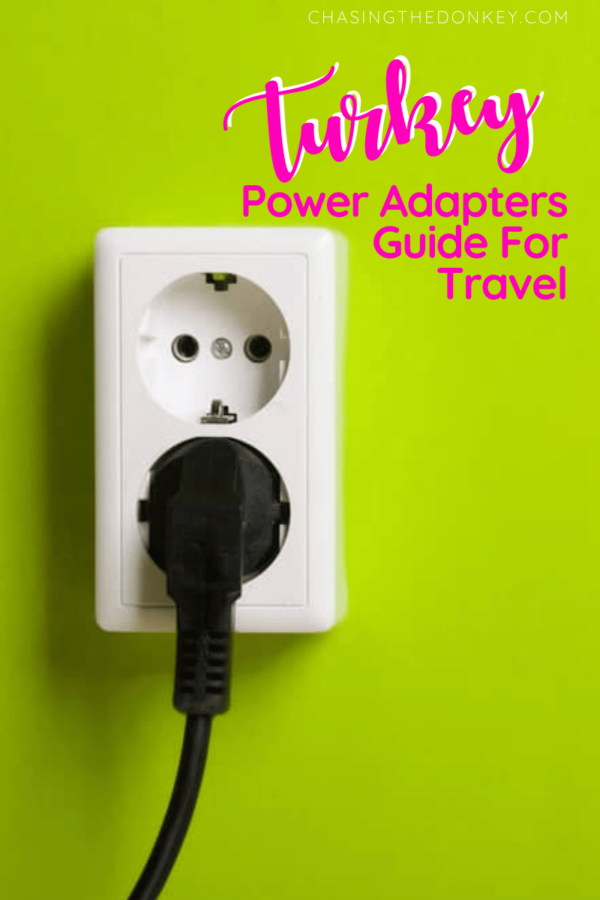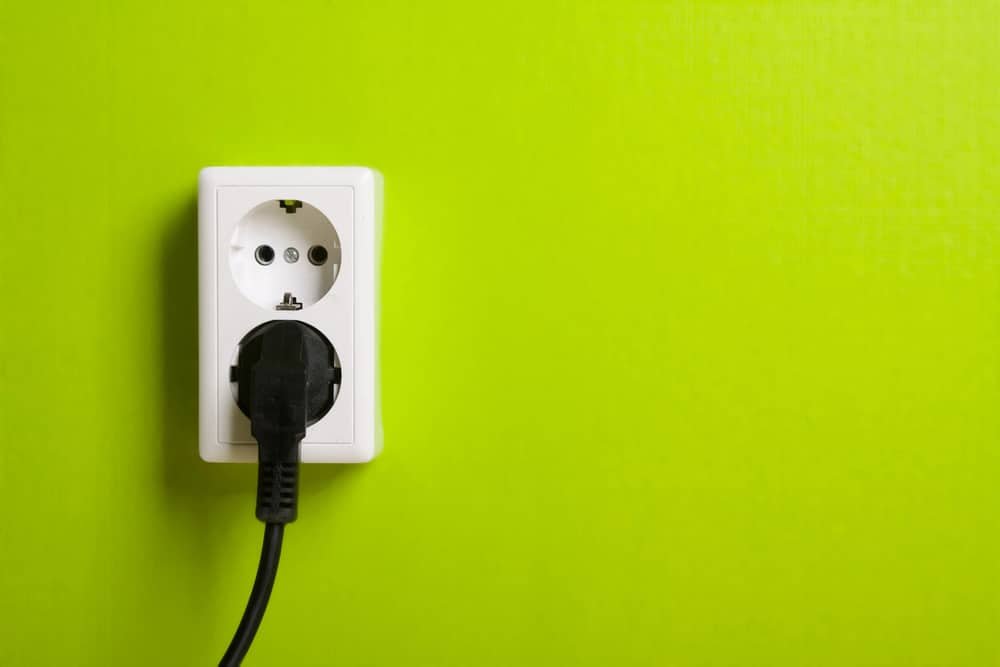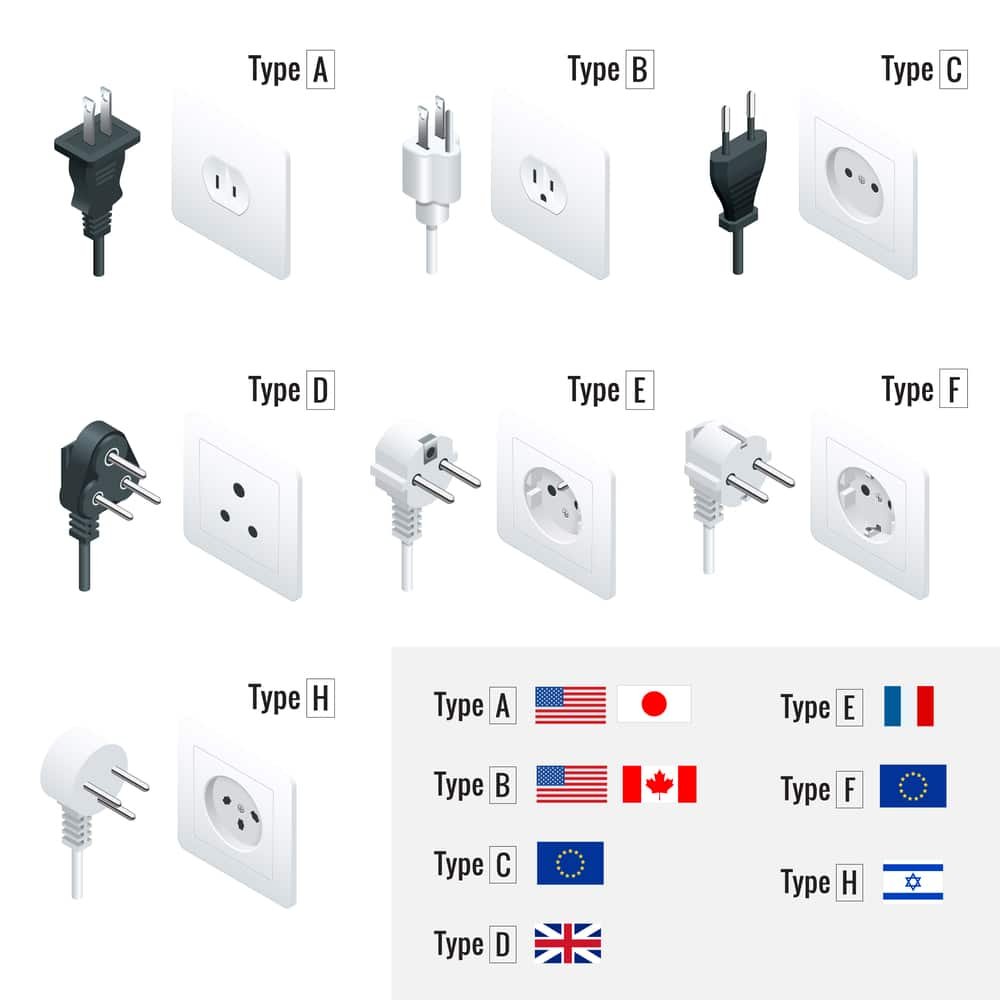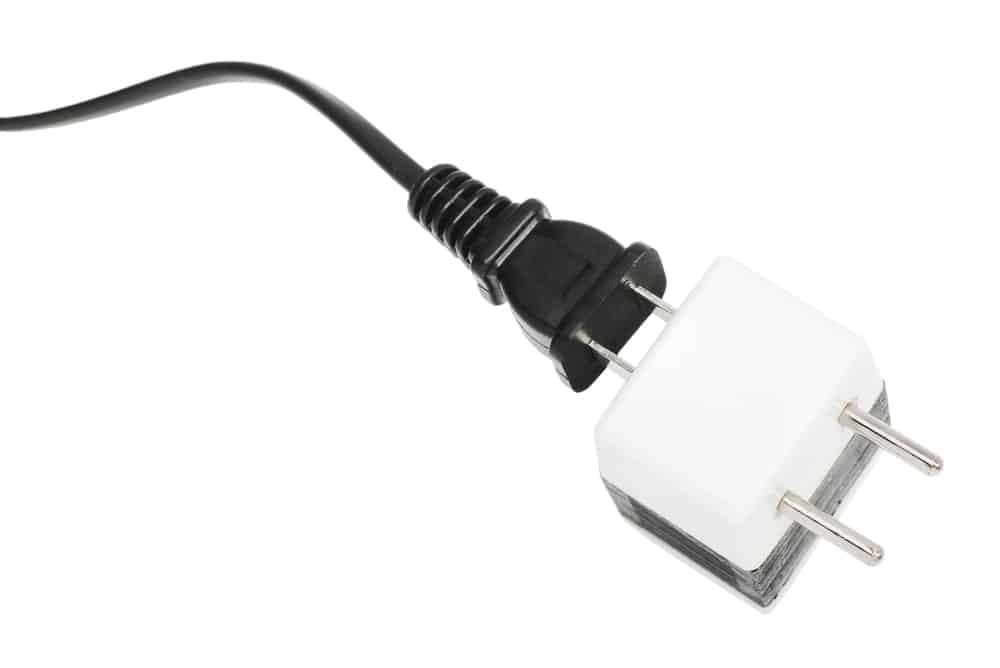If you’re planning a trip to Turkey, you’ll need to know about the types of power plugs used there to ensure you can charge your devices without any hassle. That is exactly what my travel guide is today, so please read on.

Skip Ahead To My Advice Here!
Turkey Travel Adaptors
I’ve learned that in Turkey, the standard voltage is 220 volts with a frequency of 50 Hz, which is different from what some other countries, such as the United States, use. It’s important to understand this to avoid damaging your electronics or being caught without a way to use them.
You’ll find that Turkey uses type C and type F power plugs. Type C plugs are known as the standard “Euro” plug and have two round pins, while type F, also used across Europe, includes two round pins and two earth clips on the sides for grounding. Before you travel, ensure you have the right travel adapter, and it’s a good idea to have a surge protector, too, to protect your devices from any unexpected spikes in voltage.
Türkiye Travel Adapotor Quick Facts
- Turkey’s standard voltage is 220 up to 230 volts with a frequency of 50 Hz
- Power plugs type C and type F are used in Turkey
- A travel adapter and surge protector are recommended for using your devices in Turkey
Understanding Electricity Systems & Sockets In Turkey

When I plan a trip to Turkey, I make sure to keep in mind that Turkey’s electrical system is relatively standard to what you’d find around Europe. It’s critical to know that the standard voltage is 230V, and the frequency is 50Hz.
For me, I have some devices that have an Australian plug, as well as some with the Euro plug. If you are from a country with a different voltage and frequency standard, you definitely need to pay attention to the compatibility of your devices.
In terms of plug types, Turkey mainly uses:
- Type F (known as Schuko): This plug has two round pins and two earth clips on the side.
- Type C (the Europlug): It has two round pins.
If you’re coming from Europe, you won’t need an adapter since most European countries use Type C plugs, and many also use Type F.
But if you’re venturing from the US, Australia, Asia, Canada, or anywhere with a different plug or voltage, you’ll need a trusty travel adapter.
Here’s a quick breakdown:
| Feature | Specification in Turkey |
|---|---|
| Voltage | 230V |
| Frequency | 50Hz |
| Plug Type | Type F, Type C |
What does this mean for your devices? Well, if they are rated to handle 230V and 50Hz, you’re good to go—plug them in using the necessary adapter. However, if they’re not compatible, you’ll need a voltage converter or transformer; this is often the case for hair dryers and other high-powered appliances.
Before I pack, I always double-check the details on my electronics because overlooking this has taught me lessons the hard way. A simple peek at the label on your chargers and appliances can save you from the dreaded dead device dilemma!
Identifying The Right Power Plug And Socket Types

When traveling to Turkey, knowing the plug types is essential for keeping your devices powered up. Here, I’ll help you figure out which types, Type F and Type C, are the right fit for your gadgets.
Plug Type F
The Type F plug is commonly used across Turkey. It features two round pins with two grounding clips on the side. This plug design is considered safer due to its earthed configuration, which is a safeguard against power surges. In Turkey, you’ll find that many sockets are compatible with these plugs.
- Pin Type: two round pins, similar to the Type C plug
- Grounding: it features two earth clips on the side, which make contact with corresponding clips in a Type F socket for grounding. This grounding feature is a safety enhancement not present in Type C plugs
- Compatibility with Sockets: Type F plugs are designed to fit into Type F sockets. However, Type F sockets have the added convenience of being compatible with both Type F and Type C plugs. This means you can insert a two-pin Type C plug (which does not have the side grounding clips) into a Type F socket
Plug Type C
Type C plugs are less common in Turkey as they are ungrounded. While they have two round pins like the Type F, they lack the side grounding clips. You may still encounter Type C sockets, but the Turkish standards discourage their use because they’re not earthed and can pose a risk.
- Pin Type: Two round pins
- Grounding: None (unearthed)
Brands We Use And Trust
Travel Converter & Adapters

When you’re packing for a trip to Turkey, understanding the difference between travel adapters and converters is as crucial as remembering your passport. Let me walk you through what you’ll need to keep your gadgets charged and ready to go.
When To Use A Travel Adapter For Plugs In Turkey
In Turkey, the electrical sockets you’ll encounter are typically Type C and Type F, both of which are designed with two round pinholes. If your devices have plugs with flat pins, like those from the US, you’ll need an adapter.
An adapter doesn’t change the electricity; it simply allows your plug to fit into a different type of outlet. Lucky for you, most European gadgets fit in Turkish sockets without a hitch.
Types of Plug Sockets in Turkey
| Type | Description | Compatibility |
|---|---|---|
| C | Two round pins | Europe |
| F | Two round pins; two earth clips on the side | Europe, some Asian and African countries |
When You Need A Converter Or Transformer
Here’s where it gets a bit techy. Turkey’s standard voltage is 220V, significantly higher than the 110V commonly used in North America. So, if I’m taking devices not suited for a higher voltage, I’ll need a converter or a transformer to step down the voltage to prevent damaging my devices.
Converters are suitable for short-term use, like charging your phone, whereas transformers are better for longer periods or for devices with a motor.
Device Voltage Requirements
- Check Your Device: if it says ‘Input: 100-240V’, it’s safe for Turkey; no converter is needed
- High-Wattage Appliances: hair dryers, straighteners – consider a transformer for these (or buy one of these dual voltage ones)
- Short Term Usage: converters are compact and fine for a quick charge
Remember, folks, never underestimate the value of keeping your electronics functioning while abroad. That’s why I always make sure I have the right adapter and, if necessary, a converter or transformer in my travel kit. Stay plugged in!
Using Your Devices In Turkey

When traveling to Turkey, it’s essential to understand how to use your electronic devices safely. The country operates on a 220V supply voltage and 50Hz, with Type C and Type F outlets being standard.
Dual Voltage Appliances
Most of my devices, like laptops and phone chargers, are dual voltage. This means they can operate on both 120V and 220V systems. Before plugging them in, I always check the label or power adapter for a voltage range that includes ‘100-240V’. If it does, I’m in the clear.
Checking Appliance Compatibility
For appliances that aren’t dual voltage, I need to ensure compatibility with Turkey’s electrical system. The label or manual specifies the voltage. If my appliance only says ‘120V’, I’ll need a voltage converter. Additionally, because Turkish sockets fit two round pins, if my plugs don’t match, a travel plug adapter is necessary to connect them.
Best Adaptor For Turkey
Would I recommend the TESSAN Adapter Duo? Absolutely, especially for the digital nomad or the casual tourist looking to keep their tech arsenal charged and ready. Just make sure your devices play nice with the voltage.
TESSAN Travel Adapter for Turkey
Having just come back from a trip to Turkey using my Australian hair dryer and GHD, I can say that this adapter is a solid choice for anyone needing to keep their devices charged and ready to go.
Pros
- Charging multiple devices simultaneously is a breeze
- The compact design slips effortlessly into any carry-on
- USB ports offer fast charging for phones and tablets
Cons
- Its size can block adjacent outlets, which can be bothersome
- It may not accommodate high-wattage appliances without dual-voltage capacity
- The plug design is not ideal for every type of outlet or power strip configuration
I did notice that when it was plugged into a wall socket, it took up more space than I liked, potentially blocking an adjacent outlet. This required some strategizing in tight spaces. Additionally, it’s crucial to double-check that your high-powered devices support dual voltage, which is something the TESSAN adapter requires for such electronics to function safely.
Overall, the experience with this adapter was a positive one. It performed reliably, was easy to pack, and I didn’t have to worry about my devices running out of juice in the middle of exploring Turkey—be it the grand bazaars or the stunning coastline. Despite its few drawbacks in design, its practicality makes it a must-have for any savvy traveler heading to this enchanting part of the world.
.Special Considerations For Electronics

Surge Protectors For Sensitive Electronics
Using surge protectors is a smart move if I’m packing sensitive electronics. Turkey’s electrical grid can experience surges, and the last thing I want is for my laptop or camera to get fried. I make sure to pack a surge protector that’s compatible with Type C or Type F outlets. If I’m bringing a surge protector from home, I’ll need an adapter to fit the Turkish sockets. For electronics without surge protection, I always power them down during storms or when they’re not in use, just to be safe.
USB Charging Solutions, The Best Universal Travel Adapter
USB charging has become nearly universal, so I never forget to bring along a USB charger. It’s incredibly convenient for charging phones, tablets, and other small devices.
But here’s a tip:
Some hotel rooms might not have enough outlets. I’ve found that bringing a multi-port USB charger comes in handy. They’re little lifesavers, allowing me to charge multiple devices all at once from a single socket. And if I come across a cafe or public space with a USB charging port, I can juice up while enjoying a Turkish coffee.
Carrying the right surge protector and a USB charging solution makes my stay in Turkey hassle-free, at least when it comes to keeping my electronics safe and charged.
Frequently Asked Questions About The Power In Turkey
When traveling to Turkey, knowing the compatibility of your devices with the local power sockets is essential for a hassle-free experience. Here’s a quick guide to answer your power plug conundrums.
Will my standard European plugs work in Turkey?
Yes, my own European devices with Type C plugs fit in perfectly with the Turkish outlets. The outlets in Turkey are compatible with the standard two-pronged European plug (Type C) without the need for an adapter.
What kind of power adapter is necessary for UK appliances in Turkey?
UK appliances come with a three-pronged Type G plug, which is not compatible with Turkish sockets. You will need to use a Type G to Type C or F travel adapter to connect your UK devices in Turkey.
Can I use my electronic devices from the US in Turkey without a special adapter?
US devices come with Type A or B plugs and are designed for 110V, which differs from Turkey’s 220V system. Hence, those only require a plug adapter but also a voltage converter for your devices to function safely in Turkey.
What are the differences between Turkish electrical outlets and those in the USA?
Turkish outlets typically use Type C or F plugs, which have two round pins. This is in contrast to the flat pins used in the US. Additionally, the standard voltage in Turkey is 220V, higher than the 110V standard in the US.
What should I look for in a travel adapter when visiting Turkey?
When shopping for a travel adapter, I ensure it’s compatible with Turkish Type C or F outlets. If I’m bringing devices from a country with different voltage, like the US, I should look for an adapter with a voltage converter.
Is there a difference between Type C and Type F plugs, and does it matter in Turkey?
Indeed, there is a difference: Type C plugs are ungrounded with two round pins, while Type F are grounded with two round pins and two earth clips. In Turkey, both types of plugs can be used interchangeably without any issue.


